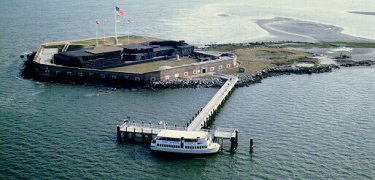![]()

|
At the heart of these events was the issue of states rights versus federal authority flowing over the underlying issue of slavery.  Fort Sumter Bombardment Confederate authorities sought throughout March 1861 to negotiate the peaceful evacuation of the Union garrison at Fort Sumter under Maj. Robert Anderson. Once convinced that Abraham Lincoln's administration would not give up the fort, Confederate President Jefferson Davis faced a crisis in diplomacy. If Sumter were not taken, the Confederate States could not boast independence; if action against it were delayed, South Carolina threatened unilateral seizure; and any action might trigger war with the United States.
~ Summary ~
By the time Lincoln took office on March 4, six more states had seceded, and Fort Sumter was one of the two Southern forts remaining under Union control. Lincoln was faced with either recalling Anderson or risking war by providing him with supplies and reinforcements. After much agonizing, Lincoln notified Pickens on April 8 that an attempt would be made to send provisions, but no troops or ammunition, to Fort Sumter, then in danger of being starved out. Three days later General Pierre G. T. Beauregard, under orders from Confederate President Jefferson Davis, demanded evacuation of the fort. Confederate troops completed construction of the fort, greatly strengthened it, and in 1863-64 held it through several massive Union attacks and a 15-month siege. Only on February 17, 1865, with the approach of the army of the Union General William Tecumseh Sherman, did they evacuate the fort.  Fort Sumter National Monument |
Author: Frank E. Vandiver; Ronald W. McGranahan, contributing.
Painting: Coutesy of the Library of Congress.
Bibliography: Current, Richard, Lincoln and the First Shot
(1963; repr. 1990); Hendrickson, Robert, Sumter: The First
Day of the Civil War (1990); Swanberg, W. A., First Blood
(1958); Vandiver, F. E., Their Tattered Flags (1970).